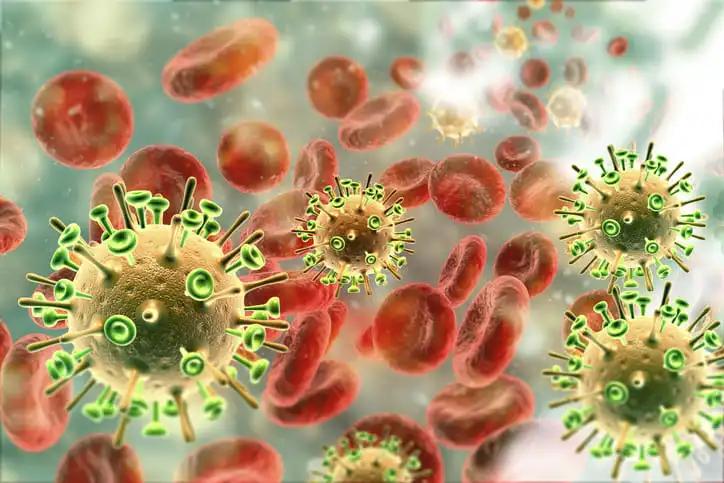KEY TAKEAWAYS
- The phase 2 AVENuE study evaluated the safety and efficacy of avelumab as a first-line treatment for classical Hodgkin Lymphoma before proceeding with response-adapted chemo.
- Avelumab, as a 1L treatment for cHL, demonstrated a response rate above the predefined threshold, confirming the efficacy of PDL1 inhibition in this context.
- The study’s results compared favorably with the RATHL study regarding iPET response, chemotherapy deliverability, and responses to eBEACOPP.
In this phase 2 AVENuE clinical trial, adult patients (pts) diagnosed with advanced classical Hodgkin Lymphoma (cHL) were enrolled. They underwent a treatment regimen of two cycles (four doses) of avelumab, followed by a PET/CT scan. They received two additional cycles of ABVD chemo and underwent a second PET/CT scan (iPET). Patients who exhibited a negative iPET result (Deauville score ranging from 1 to 3) were administered an additional four cycles of AVD chemo, and those with a positive iPET result (Deauville score of 4 to 5) received BEACOPP chemo. Historical data from the RATHL study were incorporated into the analysis for comparison.
The main objective of this study was to find out the overall response rate, that is, by achieving a complete metabolic response (CMR) or a partial metabolic response (PMR) after the initial two cycles of avelumab treatment. A response rate>40% was considered a significant indicator for further investigation, while a rate < 20% was unacceptable (5% 1-sided alpha, 90% power required 47 pts). Response assessments were conducted following the modified Lugano criteria.
Forty-seven pts were included in the study, with a median age of 30 (ranging from 17 to 58). Of the participants, 64% were male, 23% had high-risk stage II, 26% had stage III, and 51% had stage IV disease. 60% of pts presented with B symptoms. In comparison, 40% had an IPSS score exceeding 2.44 pts completed the initial two cycles of avelumab treatment, while two discontinued due to toxicity. One stopped therapy due to site concerns related to progressive disease (PD), which was indeterminately assessed using the modified Lugano criteria. 89% of the subsequent ABVD/AVD cycles were administered without delays, a rate comparable to that observed in the RATHL study. The overall response to the initial two cycles of avelumab treatment was 44.7%, with a 90% CI ranging from 32.2% to 57.7%, 11% achieved a complete metabolic response (CMR), and 34% achieved a partial metabolic response (PMR). The remaining patients were classified as having an indeterminate response (IR). After the completion of two cycles of ABVD chemo, PET scans indicated a positive response in 5 pts, representing 10.6% (95% CI: 3.5% to 23.1%), which was in contrast to the 16.3% rate observed in the RATHL study.
Patients with an IR to avelumab did not respond significantly differently to ABVD treatment than those who responded positively (87.5% vs. 88.0%). Among the patients treated with escalated BEACOPP (eBEACOPP), five pts were part of this group, with four subsequently achieving a negative PET scan result. After a median follow-up period of 14 months, ranging from 4 to 32 months, the one-year progression-free survival (PFS) rate reached 100%. However, two disease progression (PD) instances were recorded at 14 and 23 months into the follow-up. Grade 3 or higher adverse events, potentially attributed to avelumab, were observed in nine patients, amounting to 20% of the cohort. These included colitis, pneumonitis, autoimmune hepatitis, renal tubular acidosis, and two instances of tumor flare.
Avelumab, a first-line treatment for cHL, produced a response rate surpassing the predefined threshold, affirming the effectiveness of programmed cell death receptor 1 (PD1). The subsequent chemo results showed favorable comparisons to the RATHL study: the iPET response after two cycles of ABVD, the ability to administer chemo, and the response of iPET-positive pts to eBEACOPP. While the one-year PFS is promising, it requires additional follow-up for a more comprehensive assessment. These results support studying Avelumab and similar treatments more to see if they could be useful as the first choice for treating cHL.
Source: https://onlinelibrary.wiley.com/doi/10.1002/hon.3163_108
Clinical Trial: https://classic.clinicaltrials.gov/ct2/show/NCT03617666
Collins, G. P., Hawkes, E. A., Kirkwood, A. A., Clifton-Hadley, L., Tyson, C., Barsoum, E., Pettengell, R., Medd, P. G., McKay, P., Miall, F., Radford, J., Iyengar, S., Sud, A., Phillips, N., Burton, C., Peggs, K., Ardavan, A., Grigg, A. P., Lee, S., Scott, A., Barrington, S. F. AVELUMAB MONOTHERAPY FOLLOWED BY A PET ADAPTED CHEMOTHERAPY APPROACH IN THE FIRST LINE TREATMENT OF CLASSICAL HODGKIN LYMPHOMA: INITIAL RESULTS FROM THE AVENUE WINDOW STUDY https://onlinelibrary.wiley.com/doi/10.1002/hon.3163_108



